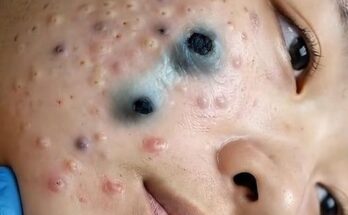It can affect how you feel about yourself, how you interact with others, and even how you express your emotions.
Talking about acne can feel uncomfortable, especially when you worry about being judged or misunderstood.
But opening up about it can actually be empowering. When you learn to speak about your skin with honesty and confidence, you create space for understanding and connection—both with yourself and with others. Acne is one of the most common skin conditions in the world, affecting people of all ages, backgrounds, and lifestyles. While it’s especially common during adolescence, many adults also experience breakouts well into their 20s, 30s, and beyond. Despite how widespread it is, there’s still a lot of stigma and misinformation surrounding acne. Some people feel embarrassed to discuss it, or they believe it reflects something about their hygiene, diet, or personality. In reality, acne is influenced by many factors, such as genetics, hormones, stress, and environment. It’s not anyone’s fault, and it’s certainly not something to be ashamed of. If you’ve ever hesitated to talk about your acne, you’re not alone. The good news is that it’s entirely possible to approach these conversations in a way that feels supportive and empowering. Whether you’re opening up to a friend, a loved one, or a skincare professional, how you talk about your acne can make a big difference in how you feel. The first step in talking about acne is to recognize your own feelings about it. Maybe your breakouts make you feel frustrated, or perhaps you’re tired of covering them up. You might feel angry, anxious, or just plain fed up. All of those feelings are valid. Before you can explain your experience to others, it helps to be honest with yourself. Try thinking about what bothers you most about your acne. Is it the discomfort? The marks it leaves behind? The way you think others see you? Understanding your emotions can help you communicate more clearly and kindly. Once you’ve taken the time to check in with yourself, you can start deciding who to talk to. It can help to begin with someone you trust—perhaps a close friend, a sibling, or a parent. Choose someone who listens without judgment and who genuinely cares about how you feel. You don’t need to prepare a speech or make it a big deal. You might simply say something like, “I’ve been feeling a little self-conscious about my skin lately,” or “I’ve been trying to take better care of my acne, but it’s been stressful.” Often, opening the door even slightly allows for understanding and empathy to flow in. When you talk about acne, remember that it’s okay to set boundaries. If someone gives you advice you didn’t ask for, or if they make comments that make you uncomfortable, you have every right to redirect the conversation. You could say, “I appreciate your concern, but I’d rather just talk about how I’m feeling,” or “I’m already working on it with my dermatologist.” Setting boundaries doesn’t make you rude; it shows that you value yourself and your comfort. If you’re speaking with a healthcare or skincare professional, being open can help you get the most from your appointment. Try describing how long you’ve had breakouts, how your skin reacts to certain products, and how your acne affects your confidence or daily life. A professional isn’t there to judge you—they’re there to help you find what works best for you. Being clear and honest gives them the information they need to guide you in a positive direction. It’s also worth remembering that everyone’s skin journey is different. Comparing yourself to others—especially to images online—can make it harder to feel comfortable in your own skin. Many photos we see on social media are filtered or edited, creating unrealistic expectations about what “clear” skin looks like. Acne doesn’t make you less attractive, less capable, or less confident.

It’s a normal part of being human. When you talk about your acne, try focusing on your experiences rather than on how you think you should look. Sometimes, humor can help lighten the mood. If you feel comfortable, making a lighthearted comment about your breakouts can take away some of their power. For example, jokingly calling a pimple a “guest that overstayed its welcome” can remind you that acne is temporary. Of course, humor isn’t for everyone, and it’s perfectly fine if you prefer a more serious conversation. The goal isn’t to make fun of yourself—it’s to approach your skin with a sense of self-acceptance and understanding. You may also find it helpful to connect with others who are going through the same thing. Online communities, support groups, or even casual chats with friends who also deal with acne can make you feel less isolated. Hearing someone else say, “I’ve been there too,” can be incredibly comforting. Just be mindful about the kind of advice or information you take to heart. What works for one person’s skin might not work for another’s, so treat shared experiences as support, not medical advice. As you get more comfortable talking about your acne, you might notice that your self-confidence begins to grow. You’ll realize that the people who matter most care more about your smile, your kindness, and your personality than about a few spots on your skin. Talking about acne openly helps normalize it, which benefits not only you but others who may be struggling silently. When you choose to speak up, you help create a more compassionate and realistic conversation around skin health. If you’re not ready to talk about your acne publicly, that’s okay too. There’s no timeline for self-acceptance. You can start small by writing in a journal about how you feel, or by practicing what you might say to someone close to you. Over time, as you become more comfortable in your own skin, the words will come more easily. The most important thing is that you treat yourself with kindness. Acne doesn’t define your worth or your beauty—it’s simply one part of your story. The way you talk about your acne can shape how you experience it. When you speak with compassion instead of criticism, you teach yourself to view your skin with patience and respect. When you share your story honestly, you give others permission to do the same. And when you set boundaries around how others talk about your acne, you protect your peace of mind. Ultimately, talking about acne isn’t just about describing breakouts—it’s about understanding yourself, nurturing your confidence, and connecting with others who understand. The next time you look in the mirror, try to see beyond your skin. You are growing, learning, and becoming more resilient every day. Acne may be visible, but so is your strength. The more you speak about it with openness and self-respect, the more you’ll inspire others to do the same.

